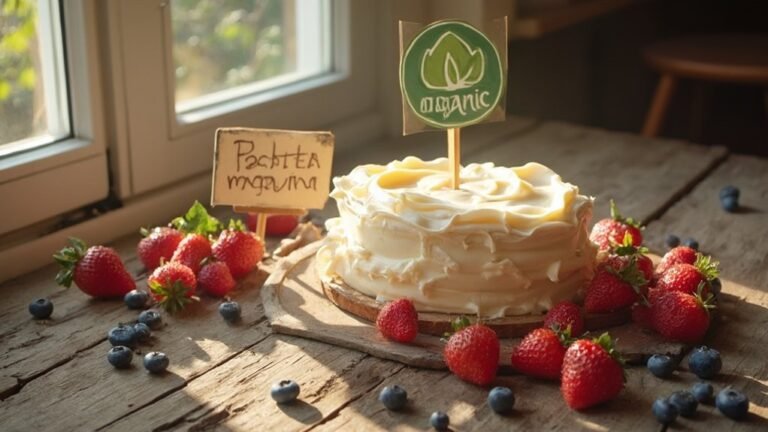Organic Cakes Vs Traditional Cakes: What’S the Difference?
Organic cakes differ from traditional cakes mainly in their ingredients and health benefits. Organic cakes use high-quality, natural ingredients that are free from pesticides and synthetic additives, providing more nutrients and antioxidants. On the other hand, traditional cakes often contain refined sugars and gluten-rich flour.
Moreover, organic baking methods focus on sustainability and eco-friendliness, while traditional baking prioritises taste and texture. For example, an organic chocolate cake might use raw cacao and coconut sugar, giving it a richer flavour and healthier profile, compared to a traditional cake made with standard cocoa powder and white sugar.
If you're curious about how these differences affect flavour and texture, there's a lot more to discover in this intriguing comparison.
Key Takeaways
Organic cakes are made with high-quality, certified organic ingredients, whereas traditional cakes typically use refined sugar, wheat flour, and dairy products.
In terms of health, organic cakes tend to be better for you, as they contain less processed sugar and more nutrients, which can help reduce chronic inflammation. For example, using whole grain flours instead of white flour can add more fibre to the cake.
The methods of production also differ; organic cakes often employ simpler techniques and alternative flours, resulting in distinct textures that you might not find in traditional cakes.
Moreover, organic baking supports sustainable practices by steering clear of synthetic fertilisers and pesticides, which helps lessen the environmental impact compared to conventional baking methods.
Many consumers are now favouring organic cakes due to their perceived health benefits and eco-friendliness. With continuous innovations in flavour and texture, organic cakes are becoming increasingly popular.
Ingredients Comparison
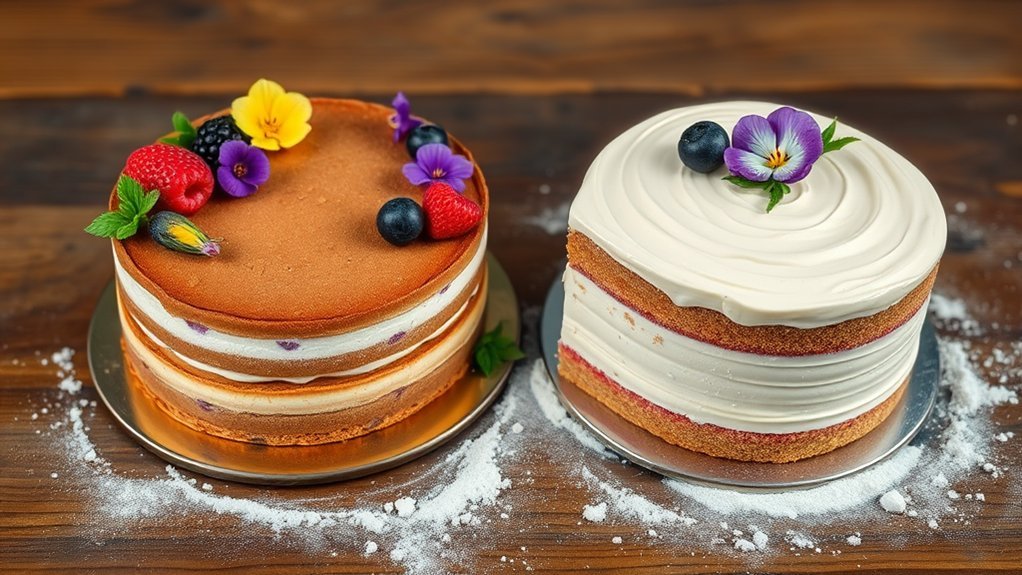
When you dive into the world of cakes, you'll quickly notice the difference between organic and traditional varieties, particularly in their ingredients.
Organic cakes use high-quality ingredients that meet USDA standards, such as organic sugar, flour, and oils. They often incorporate plant-based milks and gluten-free options like rice or millet, making them suitable for those with dietary restrictions. Many organic cakes are also free from allergens, which is a significant advantage for individuals with food sensitivities.
On the other hand, traditional cakes typically rely on refined sugar, wheat flour, and dairy products, which may not cater to vegan or gluten-free diets.
Organic cakes also favour natural leavening agents and flavour enhancers, avoiding artificial additives. This thoughtful approach to ingredient sourcing not only enhances the flavour but also makes organic cakes a healthier choice for those who care about what they eat.
Nutritional Benefits
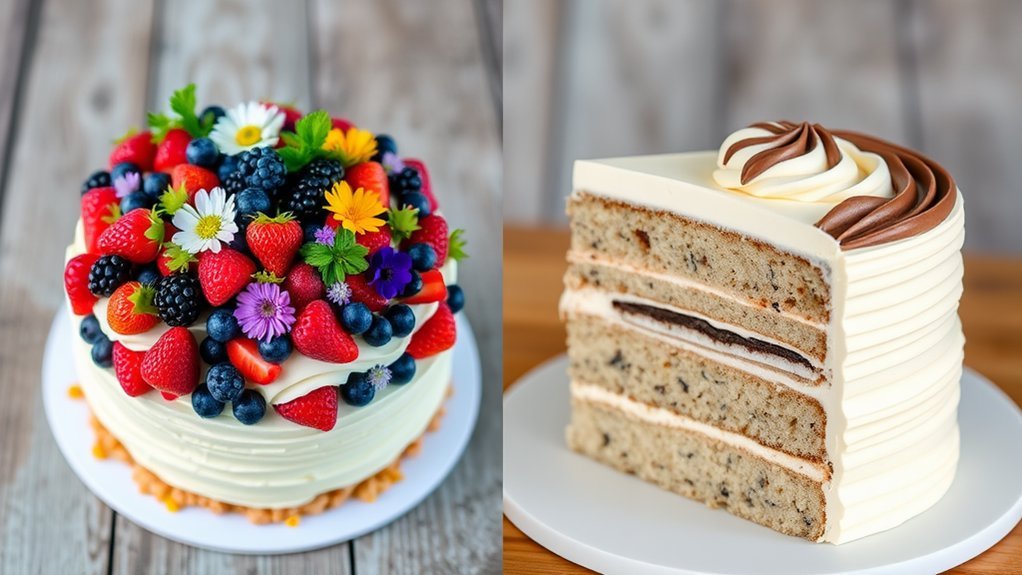
Choosing organic cakes means opting for healthier ingredients that offer real nutritional benefits. These cakes often contain less processed sugar and more nutrients, making them a wiser choice for your health. With every bite, you not only savour the taste but also enjoy the advantages of quality ingredients that nourish your body. Additionally, incorporating whole grains into your diet can help reduce chronic inflammation, further enhancing the health benefits of organic cakes.
Organic Ingredients Healthier
Organic ingredients are often regarded as a healthier option for baking, providing various nutritional benefits that enhance both your cakes and your well-being.
When you choose organic, you're selecting ingredients that are grown without harmful pesticides or GMOs, resulting in a cleaner bake. These ingredients usually have higher levels of antioxidants and essential nutrients, offering more health benefits than conventional options. Additionally, they encourage the use of whole foods, such as whole grain flours, which boost nutritional value. You'll also notice richer, more complex flavours that add depth to your cakes. Furthermore, using fresh, wholesome ingredients improves overall cake quality and enhances the nutritional profile of your baked goods.
Lower Processed Sugars
When baking, using lower processed sugars can significantly improve the nutritional value of your cakes. Consider organic alternatives such as agave nectar, maple syrup, and coconut sugar. These natural sweeteners typically have a lower glycaemic index and provide trace nutrients, making your cakes not only sweet but also healthier. Here's a quick comparison of sugar options:
| Sugar Type | Glycaemic Index | Nutritional Value |
|---|---|---|
| Refined Sugar | High | Minimal |
| Agave Nectar | Low | Trace Nutrients |
| Maple Syrup | Medium | Antioxidants |
| Coconut Sugar | Low | Minerals |
| Stevia | Low | Zero Calories |
Small adjustments in your baking can lead to delicious and healthier outcomes!
Higher Nutrient Content
Baking with organic ingredients not only enhances the flavour of your cakes but also significantly improves their nutritional value.
Organic ingredients are grown without harmful pesticides, making your treats cleaner and healthier. Using organic whole wheat flour, for instance, boosts the fibre content, allowing for better nutrient absorption with every bite.
You'll also benefit from higher levels of antioxidants, which help preserve essential vitamins and minerals.
Furthermore, incorporating alternatives like almond flour or nutritious toppings such as nuts can increase the protein and healthy fat content.
All these benefits make organic cakes a tasty and wholesome choice for health-conscious bakers.
Environmental Impact

When deciding between organic and traditional cakes, consider the environmental impact of your choice. Choosing organic supports sustainable practices and reduces your ecological footprint.
Here are some key benefits:
- Organic ingredients mean no synthetic fertilisers or pesticides, which helps protect biodiversity.
- Flour sourced sustainably supports eco-friendly practices and helps prevent deforestation.
- Using local ingredients reduces transportation emissions, leading to cleaner air.
- Energy-efficient baking methods lower energy use and greenhouse gas emissions.
Making the switch to organic not only benefits your health but also the planet.
Manufacturing Processes

Both organic and traditional cakes share fundamental manufacturing processes, but their differences are significant. Organic cakes prioritise ingredient sourcing, using certified organic components to meet regulatory standards. This emphasis on quality affects everything from flour processing to fat choices, often leading to healthier alternatives like avocado oil.
| Aspect | Organic Cakes |
|---|---|
| Ingredient Sourcing | Certified organic ingredients |
| Mixing Techniques | Simpler methods, such as Quick Bread |
| Sugar Options | Raw cane or coconut sugar |
On the other hand, traditional cakes typically employ refined ingredients and established mixing methods like the Cream Method. These variations influence not only the texture but also the overall quality and integrity of the cakes.
Flavor Profiles

When you enjoy an organic cake, you'll notice how natural ingredients enhance the flavour, making each bite a distinct experience.
Your palate will guide you through a range of flavours, from the deep richness of Tahitian vanilla to the refreshing zest of Meyer lemons.
Additionally, the textural differences between organic and traditional cakes can amplify your enjoyment, adding another layer to your dessert experience.
Natural Ingredient Influence
Natural ingredients are essential for enhancing cake flavours, improving both taste and nutritional value. By selecting the right types of flour and sweeteners, you can take your baking to the next level.
Here are some key ingredients to consider:
- Wholegrain flours: These add fibre and rich flavour.
- Natural sweeteners: Maple syrup or honey offer a deeper, more complex sweetness.
- Nuts and spices: They bring warmth and depth to your cakes.
- Coconut flour: This not only adds a unique taste but also boosts fibre content.
Using these natural ingredients ensures that your cakes aren't just delicious but also healthier.
Experimenting with them allows you to create cakes that are both tasty and nutritious, making a delightful impact on your taste buds.
Taste Preferences Variability
Taste preferences for cakes can vary significantly, shaped by various factors that influence flavour profiles.
Traditional cakes, rich in dairy and eggs, often evoke nostalgia, reminding many of family gatherings. In contrast, organic cakes typically reflect modern trends, using plant-based fats and natural sweeteners for distinct flavours.
Both types can include fruits, nuts, and spices, adding depth to their taste. You might enjoy the creativity in flavour combinations as bakers draw on global influences to craft something new.
Whether you favour the comforting taste of a classic chocolate cake or the exciting flavours of an organic option, your choices highlight a blend of tradition and innovation.
Texture Differences Explained
While both organic and traditional cakes can be delightful, their textures can vary significantly due to the ingredients.
Here's a quick overview:
- Cake Density: Traditional cakes tend to be lighter, thanks to gluten-rich wheat flour. In contrast, gluten-free cakes often have a denser texture.
- Gluten Alternatives: Organic cakes that use almond, coconut, or rice flour can have unique textures, which may be grittier or softer than those made with standard flour.
- Liquid Content: Gluten-free and vegan cakes often require more liquid, which can impact their consistency and density.
- Binding Agents: Vegan cakes typically use substitutes like flax or applesauce, altering their texture compared to traditional cakes that use eggs.
Recognising these differences can enhance your appreciation for various cake textures and improve your baking skills!
Texture Differences
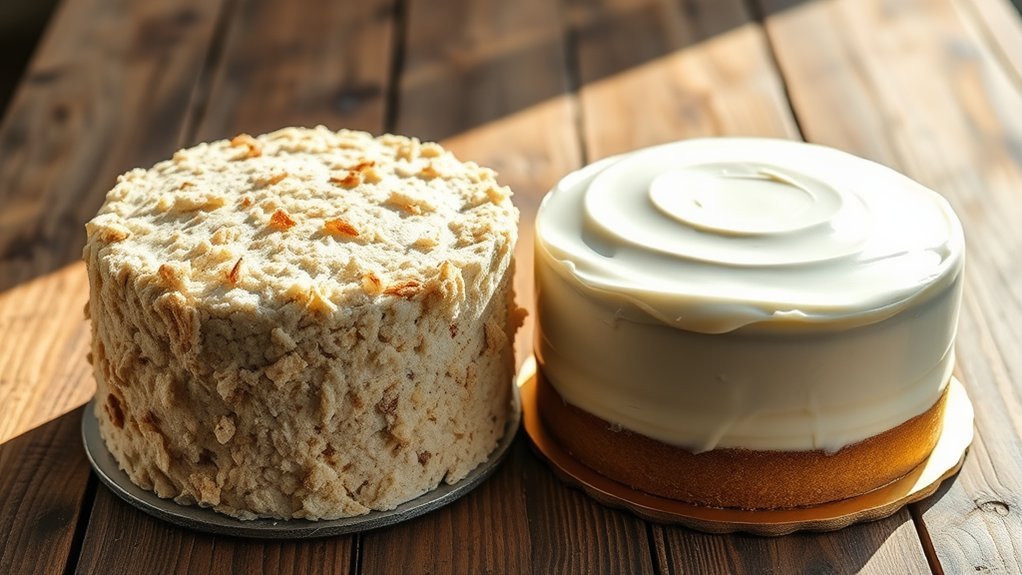
When comparing the textures of organic and traditional cakes, you'll notice clear differences due to their ingredients and preparation methods.
Organic cakes often use binding agents such as flaxseeds or chia seeds, which help retain moisture but can slightly change the texture compared to eggs. In terms of leavening, traditional cakes typically use baking soda, while organic versions may rely on natural leaveners like yeast or flax.
Organic cakes often have a richer moisture content, thanks to plant-based oils, and may use whole-grain or gluten-free flours, resulting in denser textures.
As bakers continue to innovate with ingredients, organic cakes can achieve a delightful consistency that competes well with traditional options.
Price Considerations
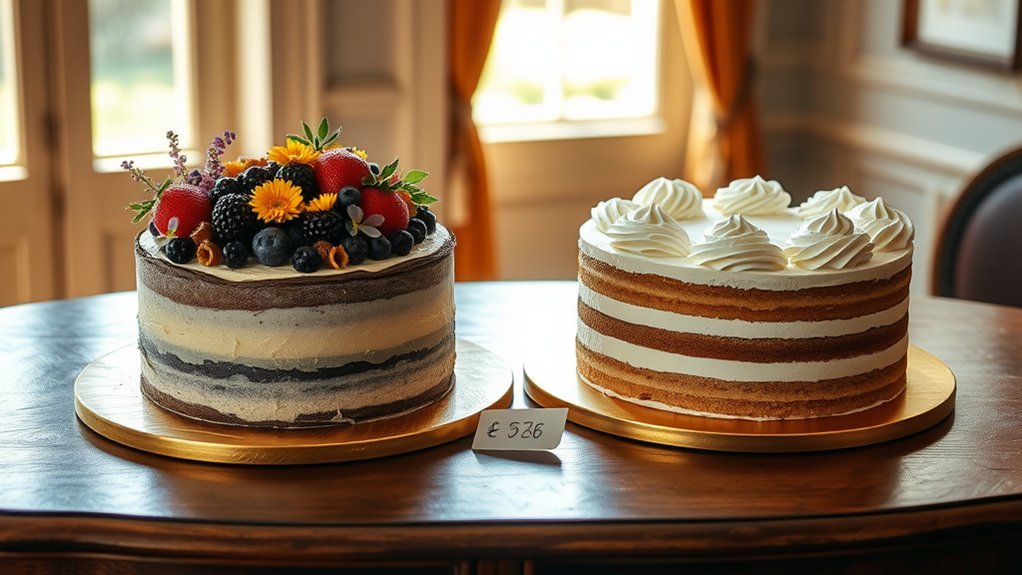
Price Considerations
The texture differences between organic and traditional cakes often come with a higher price tag, reflecting their unique ingredients and preparation.
When looking at organic cakes, several pricing factors come into play:
- Organic ingredients typically cost more due to certification and sourcing.
- Labour costs increase with the complexity of organic baking.
- The need for specialised equipment can significantly raise indirect costs.
- Geographic location influences overhead costs and market pricing strategies.
A cost analysis shows that consumers may pay a premium for organic cakes, driven by perceived quality and health benefits.
This premium pricing appeals to a niche market willing to invest in healthier options, particularly for special occasions or due to environmental concerns.
Ultimately, the price of organic cakes reflects the value of your choice.
Availability and Accessibility
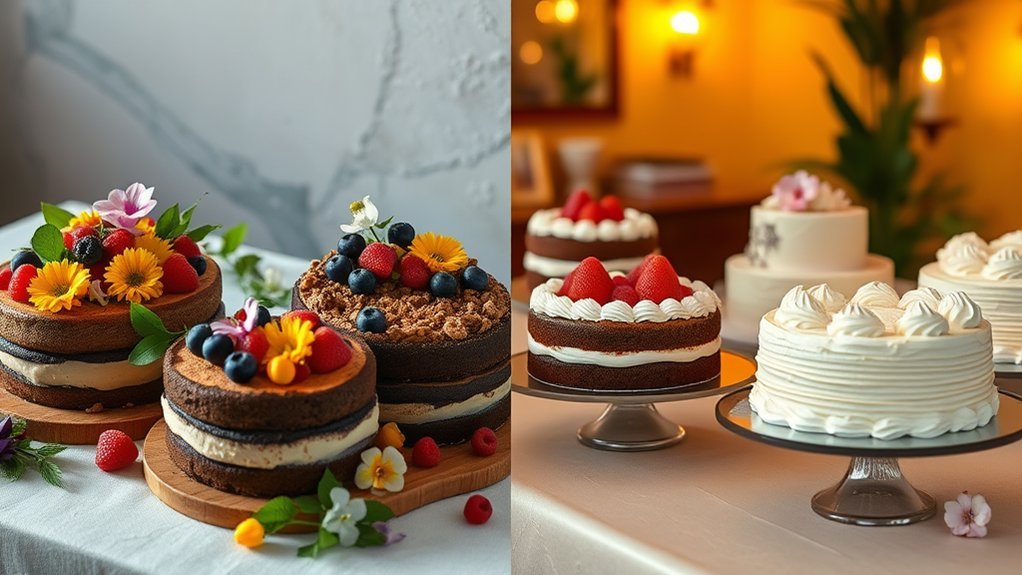
As consumers increasingly look for healthier options, organic cakes are now widely available across various outlets. You can find them in supermarkets, health food shops, and even in specialist bakeries.
Online shopping also makes it easier to access these treats, removing traditional barriers. With nearly 20,000 health food stores and a strong presence in chain supermarkets, organic cakes are becoming a common choice.
Farmers' markets also provide a unique way to buy directly from producers. However, some producers may still face challenges due to regulatory requirements and compliance costs.
Consumer Preferences

Consumer preferences are shifting significantly towards organic cakes, influenced by health awareness and sustainability issues.
Here are some key trends that may resonate with your buying habits:
- Health and safety: 65% of consumers prefer organic cakes due to their perceived health benefits.
- Sustainability: Many people regard organic options as more eco-friendly.
- Non-GMO focus: 45% actively look for non-GMO products in baked goods.
- Taste perceptions: While some think organic cakes taste inferior, others are willing to compromise on flavour for organic certification.
As you explore the market, remember that your choices reflect a growing demand for transparency and quality in organic products.
The rising popularity of organic cakes shows that you're not alone in this trend!
Frequently Asked Questions
Are Organic Cakes Suitable for People With Food Allergies?
When looking at organic cakes for allergy concerns, it's crucial to check the ingredient labels thoroughly. Even though they often use safer ingredients, cross-contamination can occur. Always inform the baker about your specific allergies to ensure your safety. For instance, if you're allergic to nuts, ask if the cake was made in a nut-free environment.
How Do Organic Cakes Impact Weight Management?
When managing your weight, it's crucial to monitor your calorie intake. While organic cakes may use higher-quality ingredients, don't be misled by their 'healthier' image—it's essential to be aware of their calorie content to maintain a balanced diet. For instance, a slice of organic chocolate cake can still pack a hefty caloric punch, much like a regular one. Always check the nutritional information to make informed choices.
Can Organic Cakes Be Made Vegan?
Yes, you can make organic cakes vegan by using plant-based ingredients. This not only improves the cake's flavour but also has health benefits, such as lowering saturated fats, all while keeping it delicious for everyone to enjoy. For instance, you could use applesauce instead of eggs or coconut oil instead of butter.
What Are Common Misconceptions About Organic Cakes?
You might believe that using organic ingredients automatically makes a cake healthier, but that's not the case; many organic cakes can still be packed with sugar or unhealthy fats. Recognising these misconceptions can help you make wiser choices in your baking.
How Long Do Organic Cakes Typically Last?
Organic cakes typically last between three to five days, depending on the quality of the ingredients and how they are stored. Without preservatives, their shelf life is shorter, but keeping them sealed and in a cool environment can help preserve their freshness and flavour for a bit longer. For example, storing an organic cake in an airtight container in the fridge can help it last closer to that five-day mark.
Conclusion
In the debate between organic cakes and traditional cakes, both have their unique appeal. If you're looking for health benefits and sustainability, organic cakes may be the way to go. On the other hand, if you prefer classic flavours and a sense of nostalgia, traditional cakes have their charm. Ultimately, it comes down to personal taste—choose what suits your palate and lifestyle. Whether you opt for organic or traditional, both can offer a delightful treat!





